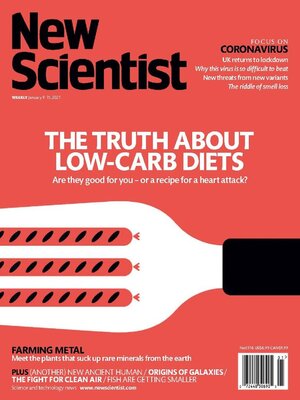New Scientist
magazine ∣ Jan 09 2021 · New Scientist

Sign up to save your library
With an OverDrive account, you can save your favorite libraries for at-a-glance information about availability. Find out more about OverDrive accounts.
Find this title in Libby, the library reading app by OverDrive.



Search for a digital library with this title
Title found at these libraries:
| Library Name | Distance |
|---|---|
| Loading... |
New Scientist covers the latest developments in science and technology that will impact your world. New Scientist employs and commissions the best writers in their fields from all over the world. Our editorial team provide cutting-edge news, award-winning features and reports, written in concise and clear language that puts discoveries and advances in the context of everyday life today and in the future.
Elsewhere on New Scientist
The riddle of the coronavirus • It is the many unknowns about covid-19 that make it so tricky to beat
New Scientist
Global crisis worsens • Many countries around the world are seeing cases surge while others are having fresh outbreaks, reports Clare Wilson
Threats from new variants • Mutated forms of the coronavirus from the UK and South Africa are providing fresh challenges for controlling the pandemic, reports Michael Le Page
The significance of smell loss • The loss of smell and taste is one of the most consistent symptoms of covid-19, so what can that tell us about the condition, asks Kayt Sukel
Smell tests for all?
Ancient human remains may be a new species
Birth control helps koalas avoid death by starvation
‘Ella’s law’ for clean air would honour her • Rosamund Kissi-Debrah, whose daughter Ella has become the first person in the UK to have air pollution listed as a cause of death, speaks to Adam Vaughan
Legal action
Growing cells on bread • Last year’s home baking frenzy inspired a tissue scaffold for cultivating muscle
Fish are shrinking as they feel the heat of warmer waters
Stonehenge scuffle • Protecting prehistoric monuments will always involve trade-offs, but has the UK government got it right this time, asks Michael Marshall
A transport revolution • More than 100 cities already provide free public transport for their residents. Many other places should get on board, says Richard Webb
The origins of galaxies • All galaxies started out as quantum fluctuations billions of years ago, but the forms they take today are incredibly diverse, writes Chanda Prescod-Weinstein
Your letters
A rising tide of optimism • The forces fighting climate science haven’t been defeated, they have just changed tactics. But a key figure in the fightback is hopeful, says Richard Schiffman
Consider the future now • Emerging technology comes with both upsides and downsides that we need to understand, says Vijaysree Venkatraman
Don’t miss
Of gods and monsters • Documentary iHuman is thoroughly committed to an apocalyptic view of society in which we are in thrall to artificially intelligent machines. That is its strength – and its weakness, says Simon Ings
Reviving the Great Barrier Reef
Breaking with bread • Are low-carbohydrate diets an easy route to weight loss or a recipe for a heart attack? Clare Wilson investigates
The keto diet in medicine
A pandemic like no other • Why has covid-19 been so problematic compared with past pandemics, wonders biologist Jonathan R. Goodman
How to grow metal • Mining is a dirty, damaging business. Can we get the metals we need from farms instead? Michael Allen investigates
Farming vaccines
Counting penguins • How are penguin populations responding to climate change? You can help researchers to find out, says Layal Liverpool
Puzzles
Almost the last word
Tom Gauld for New Scientist
Feedback







